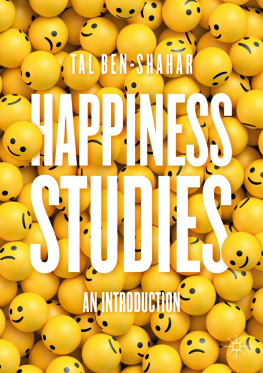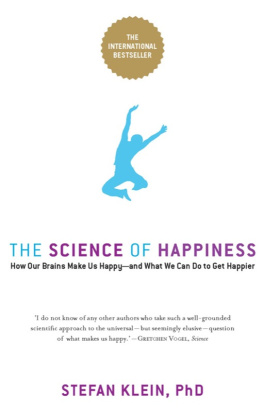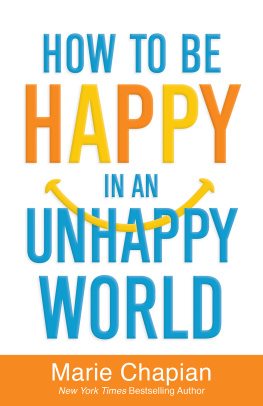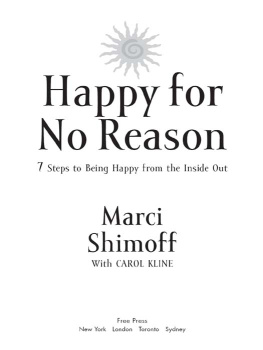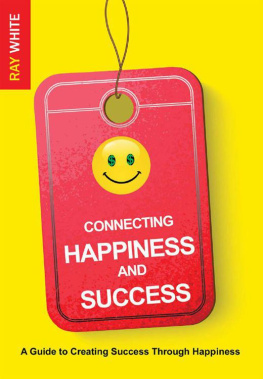The Pursuit of Perfect drew me in immediately and kept me captivated for hours. Tal Ben-Shahar seamlessly weaves personal examples, Gladwellian stories, and illuminating research findings to impart a valuable message. Every person concerned with successand that includes most of usshould read this book.
Sonja Lyubomirsky, author of The How of Happiness
This book will inspire you to realize your innate potential for happiness and awaken the genuine aspiration to change, while avoiding the trap of perfectionism and the unrealistic demands of the ego.
Matthieu Ricard, author of Happiness: A Guide to
Developing Lifes Most Important Skill
Tal Ben-Shahar has done it again! In Happier, he invited us to rethink our assumptions about happiness and what it depends on. Now, in The Pursuit of Perfect, he invites us to discard the fallacy that the pursuit of perfect is the best indicator of success and happiness.
Nathaniel Branden,
author of The Six Pillars of Self-Esteem
the Pursuit of
PERFECT
How to Stop Chasing Perfection and
Start Living a RICHER, HAPPIER Life
TAL BEN-SHAHAR, Ph.D.


Copyright 2009 by Tal Ben-Shahar. All rights reserved. Except as permitted under the United States Copyright Act of 1976, no part of this publication may be reproduced or distributed in any form or by any means, or stored in a database or retrieval system, without the prior written permission of the publisher.
ISBN: 978-0-07-160883-1
MHID: 0-07-160883-4
The material in this eBook also appears in the print version of this title: ISBN: 978-0-07-160882-4, MHID: 0-07-160882-6.
All trademarks are trademarks of their respective owners. Rather than put a trademark symbol after every occurrence of a trademarked name, we use names in an editorial fashion only, and to the benefit of the trademark owner, with no intention of infringement of the trademark. Where such designations appear in this book, they have been printed with initial caps.
McGraw-Hill eBooks are available at special quantity discounts to use as premiums and sales promotions, or for use in corporate training programs. To contact a representative please visit the Contact Us page at www.mhprofessional.com .
TERMS OF USE
This is a copyrighted work and The McGraw-Hill Companies, Inc. (McGraw-Hill) and its licensors reserve all rights in and to the work. Use of this work is subject to these terms. Except as permitted under the Copyright Act of 1976 and the right to store and retrieve one copy of the work, you may not decompile, disassemble, reverse engineer, reproduce, modify, create derivative works based upon, transmit, distribute, disseminate, sell, publish or sublicense the work or any part of it without McGraw-Hills prior consent. You may use the work for your own noncommercial and personal use; any other use of the work is strictly prohibited. Your right to use the work may be terminated if you fail to comply with these terms.
THE WORK IS PROVIDED AS IS. McGRAW-HILL AND ITS LICENSORS MAKE NO GUARANTEES OR WARRANTIES AS TO THE ACCURACY, ADEQUACY OR COMPLETENESS OF OR RESULTS TO BE OBTAINED FROM USING THE WORK, INCLUDING ANY INFORMATION THAT CAN BE ACCESSED THROUGH THE WORK VIA HYPERLINK OR OTHERWISE, AND EXPRESSLY DISCLAIM ANY WARRANTY, EXPRESS OR IMPLIED, INCLUDING BUT NOT LIMITED TO IMPLIED WARRANTIES OF MERCHANTABILITY OR FITNESS FOR A PARTICULAR PURPOSE. McGraw-Hill and its licensors do not warrant or guarantee that the functions contained in the work will meet your requirements or that its operation will be uninterrupted or error free. Neither McGraw-Hill nor its licensors shall be liable to you or anyone else for any inaccuracy, error or omission, regardless of cause, in the work or for any damages resulting therefrom. McGraw-Hill has no responsibility for the content of any information accessed through the work. Under no circumstances shall McGraw-Hill and/or its licensors be liable for any indirect, incidental, special, punitive, consequential or similar damages that result from the use of or inability to use the work, even if any of them has been advised of the possibility of such damages. This limitation of liability shall apply to any claim or cause whatsoever whether such claim or cause arises in contract, tort or otherwise.
To Tami, my love
Contents
Preface
For the last decade I have been teaching happiness.
As is true for many people teaching at universities, what first began as a subject of great personal interest to me eventually became the subject of my academic research. I started thinking about happiness as a successful but unhappy student, following several years as a successful but unhappy professional athlete. My desire to understand the cause of my unhappiness led me into the then-emerging field of positive psychology. Unlike traditional psychology, which mostly focuses on neurosis, depression, and anxiety, positive psychology focuses on the conditions that lead people, organizations, and communities to flourish. Simply put, positive psychology is the science of happiness.
I benefited a great deal from my studies of positive psychology and wanted to share what I had learned with others. I always knew, of course, that people were interested in the subject of happiness, but I never expected interest on the scale that I encountered when I began to write and lecture on how to lead a more meaningful and pleasurable life.
In letters from readers, conversations with my undergraduate students, and discussions in my seminarswhether with entrepreneurs in Shanghai, political leaders in Canberra, at-risk teenagers in New York, journalists in Cape Town, or teachers in ParisI saw how passionately committed people were to improving their own lives and increasing the well-being of their communities.
Over time, I began to see that all these diverse groups shared more than just an interest in leading happier livesthey also shared some of the major obstacles to becoming happier. One of those obstacles, arguably the number one obstacle, is the aspiration to a life that is not just happier but perfect.
This became apparent to me through two recurring, and somewhat surprising, reactions I encountered during conversations about happiness. First, people would often say that they werent happy; but as they described their lives and their feelings in greater detail, it became clear that what they really meant was that they werent happy all the time. Second, people would comment that I myself didnt seem to be bursting with joy as, they thought, a happiness expert ought to be at every moment. And when I would talk about my failures or my fears, they would express surprise that I considered myself happy despite such undesirable experiences. Underlying both of these reactions is the assumption that truly happy people are somehow immune from feeling sadness, fear, and anxiety or from experiencing failures and setbacks in life. The pervasiveness of this assumptionacross generations, continents, and culturesmade me realize something astounding: I was surrounded by Perfectionists.
I had for some time considered myself a recovering Perfectionist but had never before understood the phenomenon of perfectionism to be so pervasive. Many of the people I met and heard from, whom I recognized as fellow Perfectionists, may not have described themselvesor been seen by othersas such. Yet to greater or lesser degrees their assumptions, their ways of thinking and being, were precisely those that define Perfectionists. Moreover, they were all, in one way or another, suffering the harmful consequences of perfectionism.
Next page

